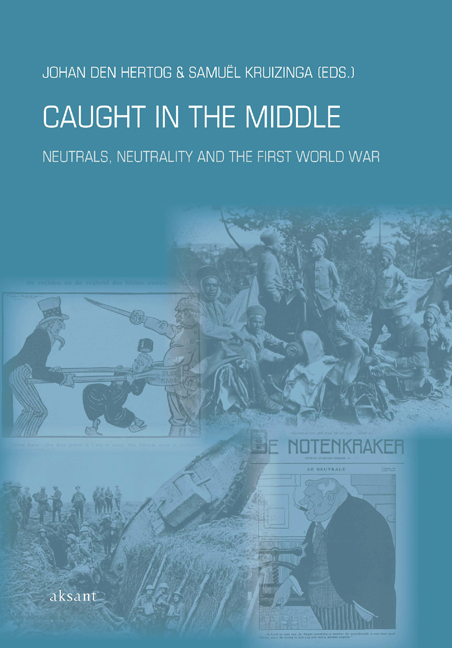Book contents
- Frontmatter
- Contents
- Acknowledgements
- Chapter 1 Introduction
- Chapter 2 Dutch Neutrality and the Value of Legal Argumentation
- Chapter 3 ‘Upon the Neutral Rests the Trusteeship of International Law’: Legal advisers and American unneutrality
- Chapter 4 Spanish Neutrality During the First World War
- Chapter 5 Britain’s Global War and Argentine Neutrality
- Chapter 6 NOT Neutrality: The Dutch government, the Netherlands Oversea Trust Company, and the Entente blockade of Germany, 1914-1918
- Chapter 7 From Parasite to Angel: Narratives of neutrality in the Swedish popular press during the First World War
- Chapter 8 Colour-blind or Clear-sighted Neutrality?: Georg Brandes and the First World War
- Chapter 9 The Hottest Places in Hell?: Finnish and Nordic neutrality from the perspective of French foreign policy, 1900-1940
- Chapter 10 The Other End of Neutrality: The First World War, the League of Nations, and Danish neutrality
- About the Contributors
Chapter 10 - The Other End of Neutrality: The First World War, the League of Nations, and Danish neutrality
Published online by Cambridge University Press: 28 January 2021
- Frontmatter
- Contents
- Acknowledgements
- Chapter 1 Introduction
- Chapter 2 Dutch Neutrality and the Value of Legal Argumentation
- Chapter 3 ‘Upon the Neutral Rests the Trusteeship of International Law’: Legal advisers and American unneutrality
- Chapter 4 Spanish Neutrality During the First World War
- Chapter 5 Britain’s Global War and Argentine Neutrality
- Chapter 6 NOT Neutrality: The Dutch government, the Netherlands Oversea Trust Company, and the Entente blockade of Germany, 1914-1918
- Chapter 7 From Parasite to Angel: Narratives of neutrality in the Swedish popular press during the First World War
- Chapter 8 Colour-blind or Clear-sighted Neutrality?: Georg Brandes and the First World War
- Chapter 9 The Hottest Places in Hell?: Finnish and Nordic neutrality from the perspective of French foreign policy, 1900-1940
- Chapter 10 The Other End of Neutrality: The First World War, the League of Nations, and Danish neutrality
- About the Contributors
Summary
In his seminal 1953 work The Decline of Neutrality, 1914-1941, the Norwegian historian Nils Ørvik noted about the First World War that ‘… neutrality became a luxury that could no longer be afforded. Therefore, it had to disappear.’ This crucial weakening of neutrality, in Ørvik's view, formed part of a general and basically linear development in the nineteenth and twentieth century, where isolationist neutrality disintegrated and was succeeded by a system of international military alliances and collective security.
There is much truth to Ørvik's interpretation. The concept of neutrality was undoubtedly critically weakened by the developments of the First World War. Still, the idea of neutrality survived as a basic point of orientation in the foreign policies of the small Western European states. And in Denmark, neutrality was upheld as more than a foreign policy cornerstone. In contradistinction to other small states in Europe, significant intellectual efforts were made to reinterpret and reinvent the concept of neutrality after the war and to maintain its status as a prominent political concept compatible with the new principle of collective security embedded in the League of Nations.
This deliberate attempt at maintaining and developing the idea of neutrality, termed ‘neo-neutrality’ by its leading advocate, the legal advisor to the Danish Foreign Ministry Georg Cohn, was closely related to strands of American neutral thinking and to that of legal expert Phillip C. Jessup in particular. However, albeit similar to contemporary American ideas of neutrality, it was not primarily an import of American ideas. Rather, it was the product of a deeply rooted foreign political ideology linked to the Danish Radical Liberal Party (Det Radikale Venstre) and, to a lesser extent, to the Social Democratic Party. As such it was met with criticism from the liberal and conservative parties, which traditionally had a narrower and more strictly legal understanding of neutrality and now subscribed to the dominant European view that the concept of neutrality was losing its relevance as a political and legal concept. Danish foreign policy debates on whether neutrality was a concept in decline or, rather, one that was evolving and expanding not only mirror the broader conflict between the dominating European and American views on neutrality but also that between deeply rooted Danish foreign policy ideologies.
- Type
- Chapter
- Information
- Caught in the MiddleNeutrals, Neutrality and the First World War, pp. 155 - 172Publisher: Amsterdam University PressPrint publication year: 2012



